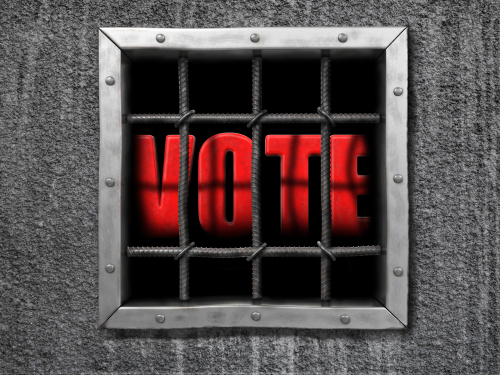Recusal a controversial issue for Lagoa after ruling keeping many Florida felons from voting

Image from Shutterstock.com.
A recent recusal decision by potential U.S. Supreme Court nominee Barbara Lagoa has raised questions about how she would deal with the issue if she is nominated and confirmed.
The Washington Post has a report on the Florida felon voting case that provoked the controversy.
Lagoa is a former Florida appellate and supreme court judge who was confirmed in 2019 to the Atlanta-based 11th U.S. Circuit Court of Appeals. Before her confirmation, she explained how she would deal with recusal issues in a written answer submitted to the Senate.
“A judge must recuse herself where her impartiality ‘might reasonably be questioned,’ ” she wrote. If she is confirmed, Lagoa said, she would recuse herself from “cases in which my husband or his law firm appeared, as well as cases involving either the Supreme Court of Florida or the Florida Third District Court of Appeals while I was a member of either court.”
Lagoa’s husband is Paul Huck Jr. His law firm, Jones Day, has represented the Trump campaign, the Post explains.
Two weeks before her confirmation, Lagoa was among the Florida Supreme Court justices who heard oral arguments in a case asking the court to decide the meaning of a Florida ballot measure on the restoration of voting rights for many Florida felons.
At issue was a phrase in the measure that restored rights “upon completion of all terms of sentence including parole or probation.” After voters passed the state constitutional amendment, the Florida legislature imposed a requirement that felons must pay fees and fines before voting. Florida Gov. Ron DeSantis asked the state supreme court for an advisory opinion on the phrase’s meaning.
Lagoa was no longer on the Florida Supreme Court when it issued its advisory opinion finding that the phrase meant felons had to pay fines, fees, costs and restitution before they could vote. But she was on the 11th Circuit when it issued a Sept. 11 en banc decision that upheld the constitutionality of the fees and fines requirement. Lagoa was in the majority.
Lagoa and Robert Luck, another 11th Circuit judge who had been on the Florida Supreme Court, rejected calls for their recusal in a July 27 decision. They said the Code of Conduct for U.S. Judges didn’t require their recusal because the state and federal cases involved different persons, different issues and different courts.
“An objective, disinterested lay person, knowing that we asked questions in a different proceeding (advisory vs. case-and-controversy), in a different court (Florida Supreme Court vs. federal court), with different issues (interpreting the state constitution vs. federal constitutional questions), and with different participants (“interested persons” vs. parties), would not reasonably entertain a significant doubt about our impartiality in this case,” they wrote in that decision.
Democratic members of the Senate Judiciary Committee had pointed to the judicial conduct code in July 21 letters to Lagoa and Luck. The code says judges should disqualify themselves when their “impartiality might reasonably be questioned,” including cases when they have “participated as a judge (in a previous judicial position) … concerning the proceeding or has expressed an opinion concerning the merits of the particular case in controversy.”
The Washington Post spoke with experts who had differing opinions on Lagoa’s decision to participate in the case.
Indiana University Maurer School of Law professor Charles Geyh said technically, the two cases are not the same, and Lagoa’s argument was not completely unreasonable. But he said he would have disqualified himself if he were a judge because of public perception concerns.
However, University of Pittsburgh law professor Arthur Hellman said Lagoa and Luck’s opinion made a persuasive argument that recusal wasn’t required.
Write a letter to the editor, share a story tip or update, or report an error.


